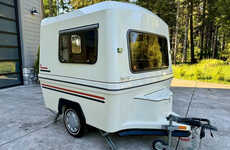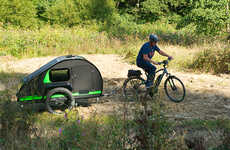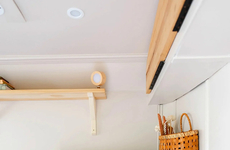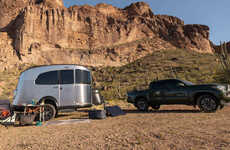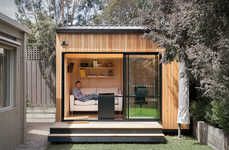
This Diy Camper is Surprisingly Made from Plastic Campaign Signs
Mishal Omar — May 15, 2016 — Eco
References: elkinsdiy & treehugger
Designed and created by DIY aficionado Paul Elkins, this tiny DIY camper is made from corrugated plastic campaign signs.
The DIY camper was built without a frame and instead has a corrugated plastic sheeting that maintains its curved shape. The tiny camper features most of the amenities featured in standard campers -- including a "stove, sink, counter, shelving, storage, LED lighting, insulation and a skylight." The wheels on the camper come from a used bicycle and the sturdy camper is insulated and held together with zip ties and duct tape. The door can act as shade from the sun or to protect from rain and it even has retractable legs to keep it from tipping forward when it is parked.
This cramped but utility-focused camper can be made by anyone with the right materials, since the designer is selling his project plan for only $20.
The DIY camper was built without a frame and instead has a corrugated plastic sheeting that maintains its curved shape. The tiny camper features most of the amenities featured in standard campers -- including a "stove, sink, counter, shelving, storage, LED lighting, insulation and a skylight." The wheels on the camper come from a used bicycle and the sturdy camper is insulated and held together with zip ties and duct tape. The door can act as shade from the sun or to protect from rain and it even has retractable legs to keep it from tipping forward when it is parked.
This cramped but utility-focused camper can be made by anyone with the right materials, since the designer is selling his project plan for only $20.
Trend Themes
1. DIY Camping - The rise of DIY camping and tiny homes opens up opportunities for businesses to offer innovative materials and products.
2. Sustainable Camper - The creation of a sustainable, eco-friendly camper opens up opportunities for businesses to provide products and materials that fall in line with this trend.
3. Low-cost Camper - The demand for low-cost, simple camping solutions creates opportunities for businesses to offer innovative and inexpensive camper designs and materials.
Industry Implications
1. Outdoor Recreation - The outdoor recreation industry could benefit from offering materials, tools, and products that cater to the DIY camping trend.
2. Sustainable Materials - The sustainable materials industry can take advantage of this trend by developing eco-friendly materials specifically for campers and tiny homes.
3. Transportation - The transportation industry can offer low-cost alternatives for campers and tiny homes, such as used bicycles for wheels or other repurposed materials to build a lightweight and affordable camper.
6.5
Score
Popularity
Activity
Freshness


